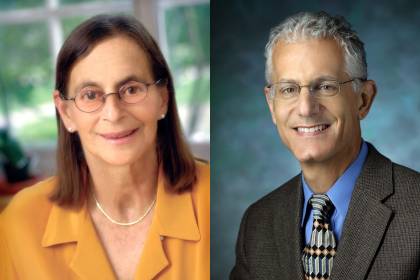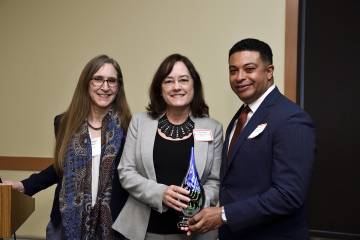Two Johns Hopkins University faculty members were recognized recently for their commitment, expertise, and caring in helping students and mentees achieve their academic and professional goals.

Image caption: Gabrielle Spiegel and David Thomas
The 2019 Provost's Award for Excellence in Faculty Mentoring will be shared by Gabrielle Spiegel, professor of history in the Krieger School of Arts and Sciences, and David L. Thomas, professor of medicine and director of the Division of Infectious Diseases in the School of Medicine. Each will receive a $2,500 honorarium and be celebrated at an event to be announced in the fall.
"Both of this year's winners are noteworthy not only for their tireless commitment to guiding others, but also for their ability to go beyond advising to open up opportunities for mentees to collaborate, grow, and make the connections that lead to success," says Sunil Kumar, provost and senior vice president for academic affairs. "It is a pleasure to recognize them with this award."
Spiegel has mentored junior and mid-career faculty for almost three decades, "fostering a spirit of shared intellectual pursuit and collegiality and modeling the work/life balance," said Anne Eakin Moss, assistant professor in the Department of Comparative Thought and Literature. Moss wrote a nomination letter on behalf of herself and other scholars who took part in the Mellon Seminars, a monthly seminar for postdocs and junior faculty to share works in progress with an interdisciplinary audience. Spiegel founded the seminar as part of the broader Mellon Postdoctoral Fellows Program, which she directed from 2005 to 2018.
"For many, [the seminars were] a first opportunity to think with an interdisciplinary audience about the larger stakes of their work," Moss wrote. "Gaby modeled this reframing for each presenter, every month. These drafts would become job talks, writing samples, major articles, first books, and key pieces of tenure dossiers."
Spiegel's academic work focuses on historiography—the theory and practice of writing history—both in the Middle Ages and in the modern era. In addition to doing research on medieval historical writing, she works on the implications of postmodern critical theory for understanding contemporary historiographical practices. She served as dean of the faculty and chair of the Department of History from 2005 to 2008.
"Gaby's astute knowledge of the inner workings of university administration, together with her high standards for intellectual rigor as well as her personal empathy for the demands of family and work have made her a highly sought-out mentor for faculty in many departments and at all stages in their careers," Moss said.
In a nomination letter for Thomas on behalf of the Department of Medicine leadership, Thomas Quinn discussed the academic accomplishments of Thomas' mentees. Their NIH-funded awards have totaled more than $100 million dollars in 10 years; they have authored more than 1,200 separate peer-reviewed manuscripts, including many in top-tier journals; and they mentor a sizable group of students and junior faculty.
"These accomplishments are directly attributable to Dave's innate ability to recognize how much guidance each particular mentee needs, and to foster [their] intellectual independence," wrote Quinn, who is director of the Johns Hopkins Center for Global Health. He noted that Thomas teaches scholars to write grants and papers, makes introductions that lead to funding and collaborations, looks for opportunities for his mentees to gain recognition by giving talks, and routinely relinquishes senior authorship on manuscripts when trainees prove themselves capable.
Thomas founded the Center for Viral Hepatitis Research in 1993 to study the hepatitis C epidemic in Baltimore and across the country, and he continues to teach and conduct research internationally. He promotes hepatitis B and C advocacy by working with the Maryland Viral Hepatitis Coalition, testifying before the Maryland State House, advocating for insurance coverage for hepatitis C medications by Medicaid, and participating in health fairs to promote HBV and HCV testing. He also founded a primary care clinic in West Baltimore for underserved patients to address health disparities in the greater Baltimore community. According to Quinn, a number of Thomas' mentees have gone on to become long-standing members of national guideline committees for hepatitis C and hepatitis B.
"It is rare to find a mentor as dedicated to his trainees' success as Dr. Thomas," Quinn said in his nomination. "He marries the virtues of patience, passion, and planning to help develop training plans for each of his trainees. His goal has been to grow a cadre of leaders in infectious diseases, and especially in viral hepatitis."
Kevin Frick, professor and vice dean for education at the Carey Business School, served as co-chair of the selection committee with Mariale Hardiman, vice dean for academic affairs at the School of Education. Frick says the provost's award, established in 2015, "recognizes faculty who are exceptional at mentoring diverse groups of other faculty members in their own departments and across the institution. In this way, the university recognizes the importance of mentoring in retaining the best and most diverse faculty in all divisions."
More information about the program is on the Office of Faculty Affairs website.
Posted in University News, News+Info
Tagged faculty, mentorships, faculty news








